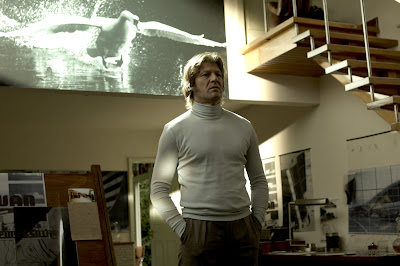Something new in cinema (though per-
haps not so much in TV), the RED RIDING TRILOGY consists of three separate films, adapted by a single scribe (Tony Grisoni) from a series of linked hunt-for-a-serial-killer novels by Yorkshire writer (David Peace) and directed by three different filmmakers: Julian Jarrold (below, left) James Marsh (below, center) and Anand Tucker (right).
Originally made for British television, each film contains a number of the same characters, played by the same actors, though with a different man-in-charge calling the shots in each case. Each filmmaker may have his own "style" (though none of the three, good as he may be, has made much of a stylistic mark so far), yet they appear to have played down their differences in order to come somewhat close to each other in final execution.
Aside from the novelty aspect, the trilogy offers some plum perfor-
mances, among them an outstanding job by Rebecca Hall (below), who went unrecognized by me (perhaps because here she's a blond), the versatile Andrew Garfield (of Boy A, shown two photos below), Paddy Considine (the second film's lead) and Mark Addy (co-lead in number three). There were actually four books in this series by Peace, but for various reasons we shall have to wait for the fourth, which Sir Ridley Scott, I believe, is on tap to produce.
The tales told in the trilogy, though each has its own "hero," are really offshoots of a single thread: tracking down the decade-long doings of a killer known as The Yorkshire Ripper. That so little progress is being made (and when there is any, it is quickly scotched) can be attributed to a combination of a corrupt police, prison and legal system, compromised journalists and an overall group of characters about as consistently sleazy as any you'll find in filmdom (or maybe film-dumb). Red Riding is one of those long sloughs through venality and corruption in which the bad guys are so thoroughly in control that they can put the kibosh on anyone, anytime, for any reason -- and never pay a price. This tends to sap energy, not to mention suspense, from the proceedings, as well as making the viewer wonder why, in a few cases, the villains waited so long to wreak their vengeance. Well, to ramp up excitement for the finale, of course!
That this corruption is unveiled in pieces over time should (and I suppose could) offer surprise and suspense. But if you have witnessed by now as many of these dark, noirish thrillers, particularly those that come from British television -- Prime Suspect, State of Play, Touching Evil and so on -- as have I, Red Riding may look an awfully lot like second-hand goods, its spruced-up, tri-director template notwithstanding. Further, after sitting through nearly six hours of dank, dark and supremely ugly doings, with the few good guys on view totally trounced, to be made to endure a feel-good finale awash with slow-mo, soaring music and flying pigeons (to the best of my know-
ledge, John Woo was not involved), is beyond the pale. It is hard to believe that the director of this episode, Anand Tucker (who has given us the good Hilary and Jackie and the even better Shopgirl) was not subjected to some of the very torture we see on view before he agreed to demean himself and us with an ending this angelic/trashy. (And the sentimental handling of the BJ character, who would hardly be allowed to live, is further fuel for the fire.)
To give credit where credit is due. Julian Jarrold directed the first episode Red Riding: 1974 (each piece goes by its year), which is filled with overdone visuals (to reflect those drug-ridden years, perhaps?) and is the worst of the lot: obvious, repetitive, and unbelievable -- not in the extent of the evil of display but that the evil would drag its feet so ridiculously long before putting right to wrong and silencing any naysayers. (That's Sean Bean in the photo below.)
Red Riding 1980 is the best of the three -- and the shortest. Director James Marsh takes a grittier, no-nonsense approach that works somewhat better, though all the back-and-forth agonizing by the character played by Considine (shown below, left) over the old wife-vs-mistress conundrum becomes tiring. We don't know enough to care much about these people, so why waste our time? Well, because giving the cop/hero his backstory is now so de rigueur that we viewers can practically write it as we watch.
Mr. Tucker's final episode, Red Riding: 1983, in addition to offering some fine work by Mr Addy, features David Morrissey (below) as the co-lead. Morrissey is always good, so no surprise that he comes through again. Whether he's romancing a "spiritualist" (the fine Saskia Reeves) or worrying that he may be on the "wrong" side (hello, dummy: you are), he takes us with him. Which is more than this trilogy manages, unless you have an unending appetite for very dark retreads.
The Red Riding Trilogy comes to us via IFC Films, where it opens Friday, February 5, in a special "New York Roadshow Presentation" for one week only, exclusively at the IFC Center, in Los Angeles at the NuArt on February 12, and in selected theaters nationwide beginning February 19.














No comments:
Post a Comment